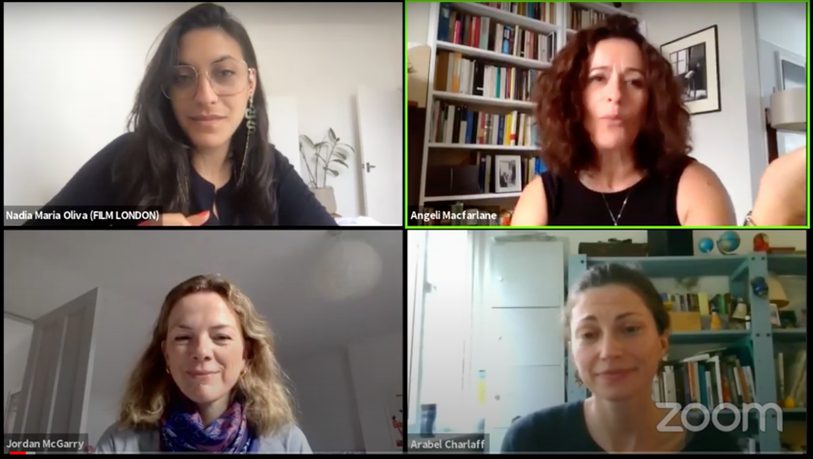News Story

Film London's Jordan McGarry and Nadia Oliva with Angeli Macfarlane and Arabel Charlaff
In the summer, we ran the the first in a new series of online Film London Labs, taking the form of a multi-session short course, led by producer Angeli Macfarlane. The lab, The Writers Sessions, was targeted towards emerging writers working in the narrative space, and we're following it up with another similarly structured course, The Genre Sessions, again led by Angeli. You can read more about this new lab, which begins on Thursday 26 November,here, including details on how to attend the course. Here, we look back on the first course, which took place over 7 sold out sessions in June, and again in September, sharing some words of wisdom from our wonderful speakers.
"The overall journey of the lab is a three-week six session course which goes into looking at the creation of atoms and rewriting of your long fiction projects. The bigger global picture of writing for long-form is something that can apply to both film and television, though there are very significant and important details that are different in each discipline."
Angeli Macfarlane, The Writers Sessions.

Angeli Macfarlane and Rungano Nyoni
Film London Labs: The Writers Sessions was divided into 6 sessions, each with their own specific theme, and, in some cases, expert speaker, including psychodynamic psychotherapist Arabel Charlaff (The 'Character' session), I Am Not A Witch writer/director Rungano Nyoni (Genre), and Monos writer/director Alejandro Landes (Visual Grammar).
On your characters:
"…Stories come out of conflict, tension, anxiety - or you could create a character who is very secure and then something very challenging happens to them. I don't think you can write a film where someone is fine and then it ends. That’s not a story... For me, there's also real value in thinking deeply and carefully about a character's backstory, which is also their internal story. It's the early environment and the early relationships which have shaped them. And it's this I think that helps writers create characters with convincing psychological consistency." Arabel Charlaff
"If a question arises, about where the character went to school, that doesn’t really matter. More interesting questions would be: Did the character go to a boy or girls’ school? Because if the story, if there is an impact in terms of the characters ability to relate to the opposite sex, for example, then that's interesting. There could be something there that we can just run with for a minute and just see what happened. Then going on to think about when you knew the character first started to really engage with members of the opposite gender and what’s sibling balance at home? These questions are more interesting." Angeli Macfarlane

Angeli Macfarlane and Alejandro Landes
On assessing your writing:
"It is important for the writer to access some of their flaws in writing as well as their strengths. Can you recognise that a scene is actually working? And when someone says to you, 'that scene does not work', is it the scene that doesn’t work or is it what’s around the scene that’s stopping it from working? And if you change the scene, that’s not the solution. So, we have to get smart about development." Angeli Macfarlane
On belief in your own work:
"Writing comes not from a position of ego but from a position that if you truly believe in something, you can sway the people that invested in you with their time, their emotions and their money. I would say that if you believe in something, then you should be able to convince the people around you to believe in it. Many times, that belief even happens before the thing itself, right? You will it into existence. Sometimes things don't have importance just as they are, but rather you give them that importance. You make it happen because you believe in it." Alejandro Landes
On your emotional response to your own material:
"A very important ambition in the writing process is to work towards the honesty and truth of your own emotional response to the material. I actually do want to know, I really do. Because by nailing it with you, I'm going to have a better understanding of how to get this material to do what you want it to do. There's the manipulation right there. But it's important because it's coming from a place of honesty, and it's directed at a place of authenticity. So, what you feel about your work is very, very crucial." Angeli Macfarlane